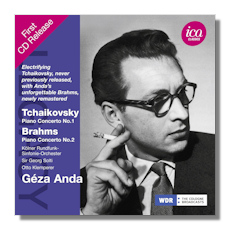
The Internet's Premier Classical Music Source
Related Links
-
Brahms Reviews
Tchaikovsky Reviews - Latest Reviews
- More Reviews
-
By Composer
-
Collections
DVD & Blu-ray
Books
Concert Reviews
Articles/Interviews
Software
Audio
Search Amazon
Recommended Links
Site News
 CD Review
CD Review
Géza Anda Plays

- Piotr Ilyitch Tchaikovsky: Piano Concerto #1 *
- Johannes Brahms: Piano Concerto #2 **
Géza Anda, piano
* Cologne Radio Symphony Orchestra/Georg Solti
** Cologne Radio Symphony Orchestra/Otto Klemperer
ICA Classics ICAC5092
Does anyone remember Géza Anda? Chances are that if you're in your 20s like me, the answer is no. It's not like piano students are grabbing up his records. But he was a fine, and exceptionally significant artist who made some wonderful recordings during his all-too-brief career. These two performances are both very important; the Tchaikovsky from 1958 is being presented for the first time, while the Brahms from 1954 shows both Klemperer and Anda at their very best.
Solti was always a high energy and excitable conductor, and he seemed to enjoy recording the Tchaikovsky concerto, because he did it many times over his long career. This then, is a fine document in clear mono sound of two artists pushing each other to new heights. The first movement is intense and majestic, with a great deal of power in the climaxes. The orchestra is good, but covers Anda during the tuttis, which is a shame. Solti keeps things moving along with an unusually involved accompaniment. Anda responds with dazzling finger work and a certain nervous energy that I confess I like very much even if it seems at odds with the composer's overt romantic language. The slow movement though, is fairly ho hum, due to Anda's refusal to really let the solo part soar, and some really scrappy orchestral contributions. There's poetry here, just not enough. Thankfully, Anda and Solti don't rush the finale, which drives relentlessly on. Again, the poetry lacks, but you can't deny the whole thing is really exciting and a whole lot of fun.
The Brahms has been released before; last I checked it was available in a big Andante box set devoted to the maestro's years in Cologne. Unless you really need that, the present ICA release is clearly the way to go. The mono sound is very clear, if not possessing the widest range. Anda plays with exceptionally skill, and Klemperer, no Eugene Ormandy when it came to soloists, seems exceptionally comfortable here. He always was a great Brahms conductor, and here, at the beginning of his "Indian Summer" and in reasonably good health, he does exceptionally fine work. Again, the orchestra plays decently enough, but this Brahms' two easily holds its own against other mono versions of the time, and surpasses most of them. It's also less idiosyncratic than the Tchaikovsky, and should please anyone looking for a fresh and exciting take on the work. Many thanks to ICA for this disc. Next time someone asks "Who was Géza Anda?", you can look to this disc. I promise you'll remember him fondly.
Copyright © 2013, Brian Wigman





















